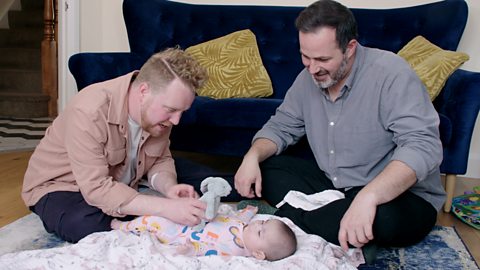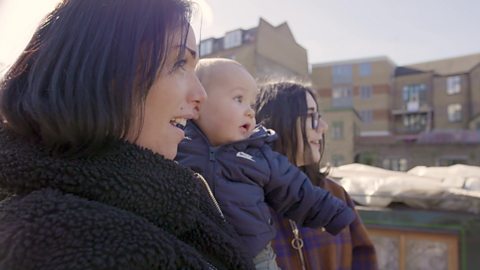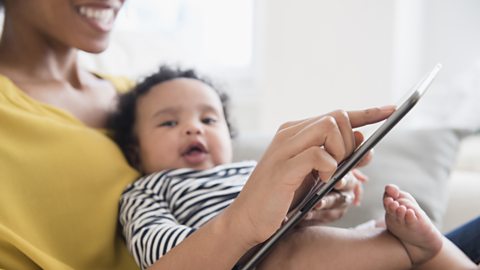
Given the circumstances over the past few years, it’s understandable that fatigue may set in and parents might have allowed their little ones more than the usual amount of screen time. However, concerns are growing in relation to children’s mental and physical health.
We spoke to speech and language therapist Janet Cooper about the impact of too much screen time, how we can make a positive of time on devices and the simple steps we can take to pull our families away from the screens.

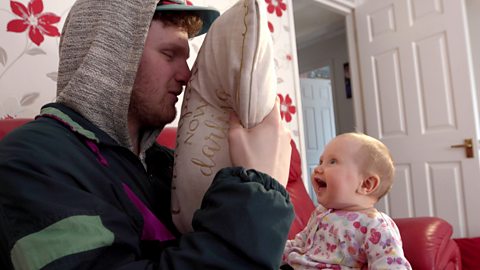
Impact on development
‚ÄúThere‚Äôs no hard and fast rule around screen time‚ÄĚ, says Janet. ‚ÄúYou‚Äôve got to use some common sense and see what reaction your child is having‚Ķ it‚Äôs all about balance.‚ÄĚ
‚ÄúYour brain has a built-in ‚Äėseeking system‚Äô‚ÄĚ explains Janet. ‚ÄúIt‚Äôs activated by the people around you. If babies are spoken to one-to-one and people show them interesting things, that develops the seeking system to make them explore and make the most of the world around them‚ÄĚ.
This ‚Äėseeking system‚Äô is key to our motivation and desire to explore and understand from an early age, and it‚Äôs learnt through human interaction. ‚ÄúWe can depress children‚Äôs seeking systems with too much screen time and not interacting face-to-face‚ÄĚ
Children also have a 'play system' in their brain. ‚ÄúYou‚Äôre intuitively born to play‚ÄĚ, Janet tells us. ‚ÄúYour primitive brain is already hardwired to play, but again, it needs activating.‚ÄĚ
Interactive play in particular helps to develop this system of the brain. Simple things like a game of peekaboo or tickling activate this part of the brain and can’t be easily substituted for an on-screen activity.

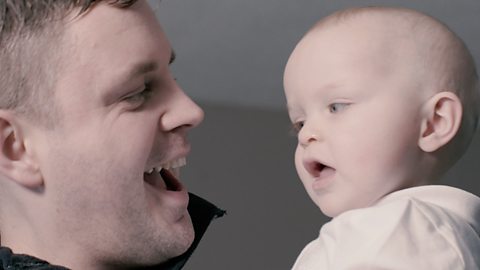
Impact on social skills
The impact of too much screen time on children’s social skills depends on what stage of development they are at. As children learn most crucial skills in their first year, this is a key time for them to get as much human interaction as possible.
‚ÄúIf young children have not developed social skills already there is a risk if there's less face-to-face time‚ÄĚ, says Janet. ‚ÄúSo, what babies and young children, really, really need is lots of opportunity to see faces and be talking to somebody face to face.‚ÄĚ
And it‚Äôs this physical interaction that helps build the foundations of language. ‚ÄúWe call it serve and return, where one person speaks, and then the other replies‚ÄĚ, Janet explains. ‚ÄúIf there's too much screen time introduced too early on, or the adults‚Äô attention is taken away by screens, the babies and young children may be missing out on some of those key interactions‚ÄĚ.
But could these interactions be mimicked through on-screen activities? Not for the youngest children, Janet tells us. ‚ÄúBabies can't see all the colours at birth, so actually sticking a newborn baby in front of the TV or another screen‚Ķ they‚Äôre getting very little from that.‚ÄĚ

There‚Äôs also an effect on slightly older children who may be learning remotely. ‚ÄúSometimes children are missing out on some of the subtle cues on remote conversations‚Ķ it is a risk in terms of children being attuned to other people and picking up those cues‚ÄĚ.
Thankfully, this is something that can be addressed. ‚ÄúIf your children are having screen time, make sure you're balancing that with face-to-face human time, just a simple conversation, turn that screen off and get down to your child's level and be face to face‚ÄĚ.
What babies and young children really, really need is lots of opportunity to see faces and be talking to somebody face to face.
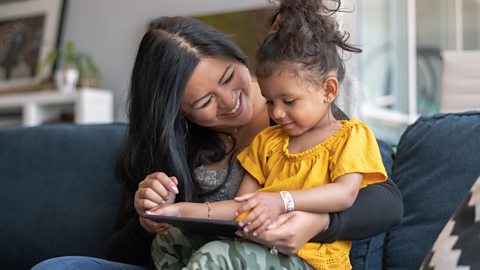
How can we counteract the rise in screen time?
To maximise the quality of your child‚Äôs screen time, try making it a collective experience and think of ways you can add to what‚Äôs going on on-screen. ‚ÄúIf you're going to watch a programme, watch it together and then talk about it and do some follow up activities, so the screen becomes more meaningful in everyday life‚ÄĚ, suggests Janet.
And if the tablet, laptop or phone does need to be put away, establish some rules around that. ‚ÄúChildren learn rules very quickly. They look up to the adult to create the rules and they want you to stick to them, because it makes them feel secure. It's about working out what the rules and boundaries are around screen time in your house.‚ÄĚ
There are ways to get young children involved in setting these rules too. ‚ÄúMake a box together, where you decorate it and make it really special and that becomes the resting place for the device.‚ÄĚ The box can then be placed out of reach and a boundary about screen time is established.
Creating a visual timetable can also help younger children to understand how their screen time fits into the wider day. For example, an image of a tablet / phone followed by an image of mealtime can help your child to learn that the screen goes away when it’s dinner time.

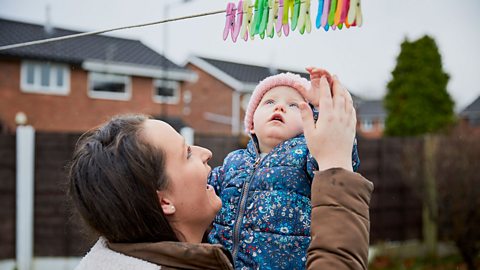
Make the most of being away from a screen
‚ÄúI think the easiest thing is making your chores and everyday things you have to do into an interactive experience‚ÄĚ, suggests Janet. ‚ÄúSo, if you're going to wash up, give your little one a little washing up bowl too and get them alongside you. Talk about the bubbles and the temperature of the water.‚ÄĚ
It’s a way of getting that valuable interaction with your child without having to make new time and it also gets them moving and gives their eyes a rest from screen glare.
And of course, the value of getting out of the house and into the outside world shouldn’t be taken for granted.
‚ÄúGetting outside boosts the serotonin in our brains. It‚Äôs the ‚Äėfeel good‚Äô chemical and we can get it from seeing colours in nature like the blue of the sky or the green of grass‚ÄĚ.
And getting outdoors doesn’t just help with feeling good, it can also play a role in children’s speech and language development.

‚ÄúChildren learn so much from connecting what they're seeing, hearing, smelling and tasting, and outdoors you get to see far more things. You get that new vocabulary, but in a multi-sensory way‚ÄĚ.
That multi-sensory experience helps children to understand words better and help connect them to the real world. You can play games around it such as ‚ÄėI Spy‚Äô or a where you tick off different things you have seen on your walk.
Getting outside boosts the serotonin in our brains. It‚Äôs the ‚Äėfeel good‚Äô chemical and we can get it from seeing colours in nature like the blue of the sky or the green of grass.
Tiny Happy People activities
As well as the suggestions above, Janet has also handpicked some Tiny Happy People activities that can be done around your home and outdoors.

